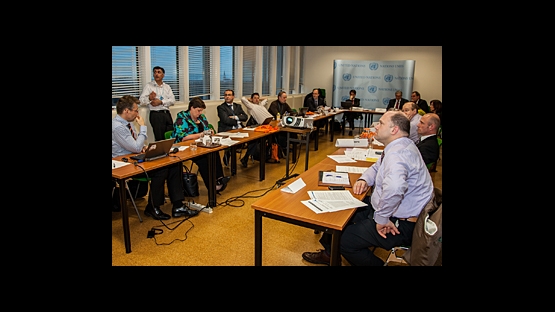Meeting for the fourth time since 2011, representatives from the IAEA and several UN agencies have drafted an Action Plan to bring forward the global agenda for the prevention and control of non-communicable diseases (NCDs). The Task Force also decided to continue with individual or joint initiatives among UN agencies and discussed models for funding and further coordination.
The NCD Task Force Meeting was held from 11-12 December 2012 at the IAEA in Vienna, the first time the group met outside of Geneva. Experts from the IAEA, World Health Organization (WHO), United Nations Development Programme (UNDP), the Joint United Nations Programme on HIV and AIDS (UNAIDS), United Nations Relief and Works Agency for Palestine Refugees in the Near East (UNRWA), International Telecommunications Union (ITU) and the World Intellectual Property Organization (WIPO) were in attendance.
The group was meeting 15 months after a high-level UN political declaration on NCDs made in New York in September 2011.
In his address to the Task Force Meeting, IAEA Deputy Director General and Head of the Department of Technical Cooperation, Kwaku Aning, said that: "The decision to host this meeting in Vienna is significant for several reasons. It recognizes the contribution of the IAEA to the prevention and control of NCDs, in particular in cancer control. It also demonstrates that the path taken by the WHO and the IAEA in 2009 in joining forces to fight cancer efficiently can be brought to the next level by joining the forces of all the relevant UN agencies, funds and programmes to effectively address non-communicable diseases."
"Non-communicable diseases are a largely ignored but an extremely important area," according to Dr. Douglas Bettcher, Director of the Tobacco Free Initiative at the WHO. "NCDs account for 63% of all the deaths in the world with potential economic and social toll estimated to reach US $43 trillion between 2010 and 2025."
Non-communicable diseases cover cardiovascular diseases, chronic respiratory diseases, cancer and diabetes. The four major risk factors for NCDs are tobacco use, diet, lack of physical activity and use of alcohol.
A core principle of the Political Declaration is that the health sector cannot combat the effects of NCDs by itself; it requires the cooperation and strategic collaboration with other sectors to do an effective job. The WHO has been assigned the lead role within the UN System, though inter-agency cooperation and formation of strategic partnerships among international organizations is encouraged to scale up the implementation strategy particularly at the global and the national level.
The main purpose of the Fourth Task Force Meeting on NCDs was to create a work plan and explore areas of collaboration among UN agencies. It further sought to develop common strategies for the UN family to work together to scale up and intensify collaboration to effectively combat NCDs.
An example of existing partnerships is demonstrated by the WHO and IAEA. The IAEA's Programme of Action for Cancer Therapy (PACT) and WHO have been working together to combat cancer in low and middle-income (LMI) countries. The IAEA and WHO formalized their collaboration by creating the WHO-IAEA Joint Programme on Cancer Control in 2009.
This collaboration, as well as initiatives from joint programmes between ITU/WHO and UNAIDS/WHO, were presented at the meeting, forming the basis from which a core set of joint programmes may be taken forward under an agreed plan of work.
Background
Currently, chronic diseases claim more than 35 million lives each year. This figure includes 16 million premature deaths of people under the age of 70. WHO projects that the burden of NCDs will continue to increase by a further 17% over the next ten years, with most occurring in LMI countries.
Through PACT, the IAEA has built partnerships within to combat cancer in developing countries. PACT seeks to build upon existing initiatives in enhancing radiation medicine technology to better enable LMI countries to introduce, expand and improve their cancer control programmes.


